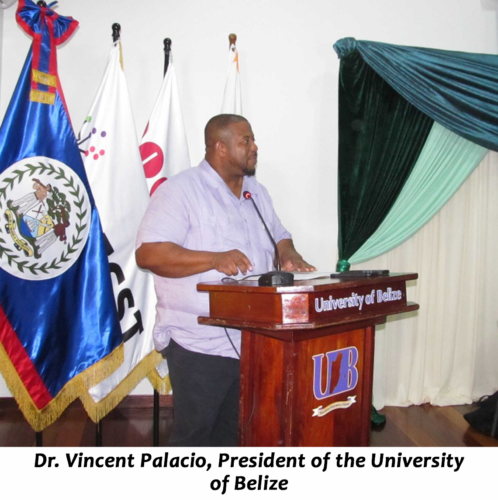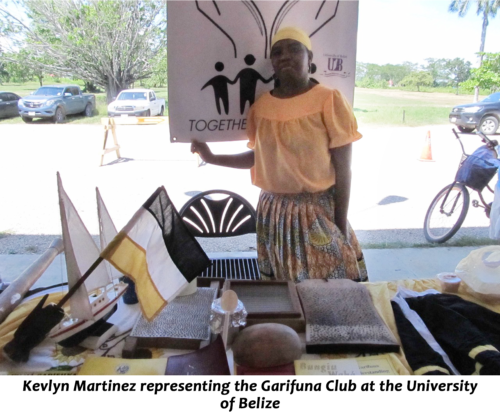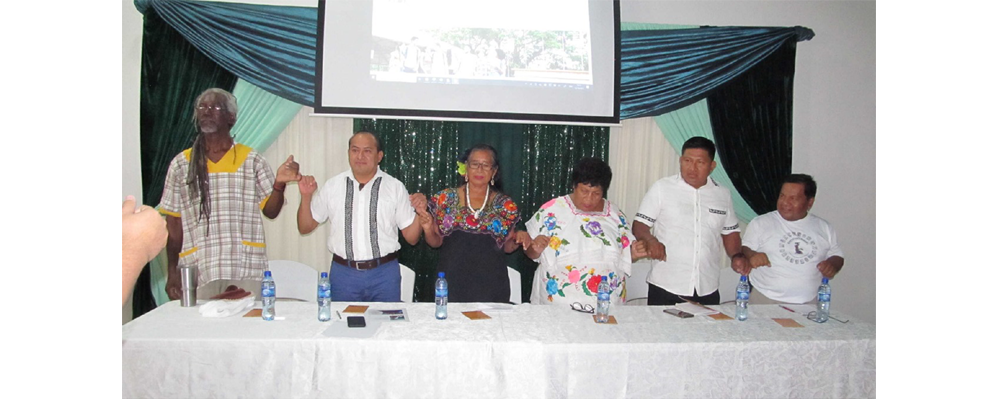Photo: Representatives from the panel of cultural groups sing and join hands together
by Orlando Pulido
BELMOPAN, Thurs. Oct. 12, 2023
The University of Belize (UB) and the Institute for Social and Cultural Research-NICH celebrated Indigenous People’s Resistance Day at UB’s Conference Center in Belmopan on Thursday with the first Indigenous People’s Resistance Day Forum. It was held under the theme: “Advancing Indigenous Languages and Cultures of Belize and the Region.”
Discussions were led by indigenous organizations in Belize and were aimed at highlighting the ongoing efforts to safeguard language and culture within their communities. Presentations were made in English, Yucatec, Mopan, Q’eqchi, and Garifuna.

“We continue to frame around such issues along language and identity,” said Dr. Vincent Palacio, president of the University of Belize.
“They are what makes the country unique in their own way,” he said.
Rolando Cocom, Director of the Institute for Social and Cultural Research at the National Institute of Culture and History, also spoke.
“These 20 years are but a brief moment … merely a snapshot,” he reported, referring to NICH’s 20th anniversary.
“At NICH our commitment is to support culture … is evidence of a brighter future,” he went on to say.
Rolando Cocom also said that Belize announced last year a decade of focus on indigenous languages. However, most of those languages are under threat, he proclaimed.
Dr. Roy Cayetano, a representative of the National Garifuna Council, joined in by stating that Belize needs to have an official language policy. He stated, based on the research he has done, that ‘the Colonial Project’ was determined to replace native languages.

“Education and religion were agents of this project,” he noted.
The good news from Dr. Roy Cayetano was that hymns were now in Garifuna, and mass was now being celebrated in Garifuna. He affirmed that native languages are no less important than English.
However, he pointed out that we need to develop human resources such as linguists and anthropologists to deliver the linguistic and other materials.
“We have to have the necessary financial resources,” said Dr. Roy Cayetano, as the United Nations celebrates a decade of indigenous languages.
Pablo Mes, a representative of the Maya Leaders Alliance in Southern Belize, also contributed to the forum. According to Mes, language is the main artery through which knowledge is transferred from the elderly to the young.
Felicita Cantun Cocom from the Northern Maya Association reported that the Maya Yucatec language has been taught in Yo Creek since 2005. The native language is being taught to 7- to 14-year-olds.
The forum was followed by a cultural fair on the UB Belmopan Campus. Kevlyn Martinez represented the Garifuna Club at the University of Belize. Her group is named the Uuera Lidan Aban Student Association.
This forum was possible thanks to the collaboration among the University of Belize’s Intercultural Indigenous Language Institute and its Regional Language Center, the National Institute of Culture and History via its Institute for Social and Cultural Research, and the Ministry of Education, Culture, Science and Technology.
Belize’s second yearly Indigenous People’s Resistance Day was observed on October 9. The day was previously observed as Columbus Day.

